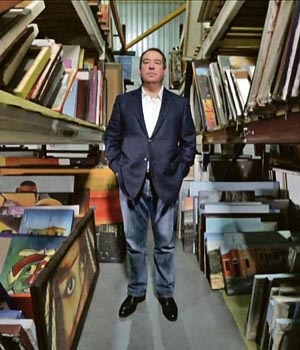
The world of patronage is a double-edged sword – one wielded by some of the world’s wealthiest elite who earned their fortune, in many cases, doing the type of business that most artists could only paint as dark and sad. In the world of arts patronage, there is no shortage of these shadowy figures who walk around art fairs anonymously snapping up works of emerging creators for whom the money provides an opportunity to create more. They are two difficult subjects to reconcile yet, in a commerce-driven art market that relies on patronage to get by, they are rarely talked about.
Enter South Africa’s Ivor Ichikowitz, the founder of the Paramount Group, a role player in the world of arms and sole owner of the largest private defence and aerospace producer in Africa. In the same week that Paramount announced that commercial production of its Arhlac reconnaissance aircraft would begin, the most expensive aerospace development project in the history of South Africa, you would think that business would keep the man busy enough. However, on Wednesday last week Ichikowitz invited City Press to talk at his sleek offices at a prime spot overlooking Sandton City before the launch of the Ichikowitz Heritage Art Collection – one of the largest and most valuable collections of African art in the world – scheduled to premiere to the public during the upcoming Art Week Joburg.
Why are you launching the Ichikowitz Heritage Art Collection now?
Our foundation has been involved in a whole host of projects over the years that deal with oral history, music and heritage in general. As we’ve worked through the process of collecting oral history over the past 25 years, we realised that there were a lot of events that were going on in this country that were never properly recorded. One of the most difficult things to record is emotion and sentiment – nothing captures that better than art.
We started collecting contemporary art, primarily street art – made on the streets of this country – between the early 1970s and today. We’ve amassed an amazing collection of many, many thousands of pieces, which has taken years to curate. Now we’re ready to launch the heritage collection as one that we want to make accessible over a whole number of exhibitions over the next couple of years.
For a lot of South Africans, art collecting is quite a foreign concept. How would you advise someone who wants to start buying?
When you think of the concept of ‘collecting art’, the first thing that comes to mind is an economic imperative – the value of art as an asset class – but that is not our view. Our view is that art has value as a communication medium, but by default, is also an asset class.
The art in our collection was made by artists who needed to earn a living, so the primary objective for them was to make art that could be sold.
There is a very limited culture of buying art for the majority of South Africans, so we want to promote that because, ultimately, if there is a market, then artists can continue making art.
It’s not just for the elite.
How did you go from being an actor to working in the defence business?
A lot of people are absolutely amazed that I was once an actor, but the truth is that art is business. I was never a fine arts student, but I was a film maker, producer, actor, director and lighting designer. The truth is, it is a business like any other.
The art business is the business of communicating, so for me it was a very easy transition from being in the business of theatre and film making to being in conventional business.
My background has been a huge asset. The arts are not about academia – they are about integrating communication skills into the real world.
What specifically shifted your career so dramatically?
One of the greatest skills that my training gave me was the ability to be sensitive to my surroundings.
My transition into business came about because I saw an opportunity in a problem that needed to be solved. In 1993, the whole of Africa had gone mad.
There was conflict all over the show, the genocide in Rwanda was in full swing, and South Africa had just gone through its transformation, so it became very clear that the development of the rest of the continent was not going to be possible unless peace, security and stability were brought to Africa.
After studying African literature and then travelling a lot of the continent, I started noticing that most Africans were making their money in Africa, but were exiting their investments because they didn’t trust their governments to look after their assets.
I realised the only way this issue could be fixed was to help governments create institutions that could help protect their security. I felt that I could play a role in doing this, so I started a business that addressed that reality.
Someone once asked you why you don’t like being called an arms dealer, and you responded by saying that calling you an arms dealer was like calling the CEO of GlaxoSmithKline a drug dealer.
Unfortunately, the whole label of arms dealer is very, very unfortunate, and I still very much stand by what I said then.
The truth is that I am an industrialist who has had the privilege to lead a major industrial company that employs 3 500 people.
I am very privileged to be in that position, and very privileged also to be involved in the highest level of innovation that this country is involved in.
We continue to amaze ourselves and the world with what we’re doing in this country. You will always have detractors, and I suppose one always becomes a victim of one’s own success, but I’ve learnt to live with that and become quite comfortable with the fact that we are making a difference.
We’re contributing to the growth and development of our economy and we’re doing stuff that is playing a role in making the emerging economy of South Africa a fully fledged First World one.




 Publications
Publications
 Partners
Partners








